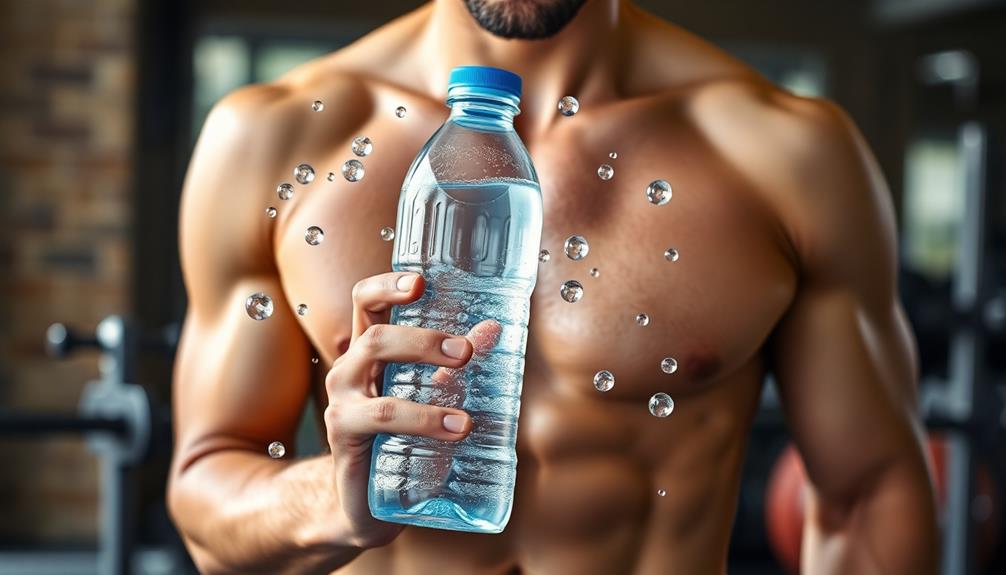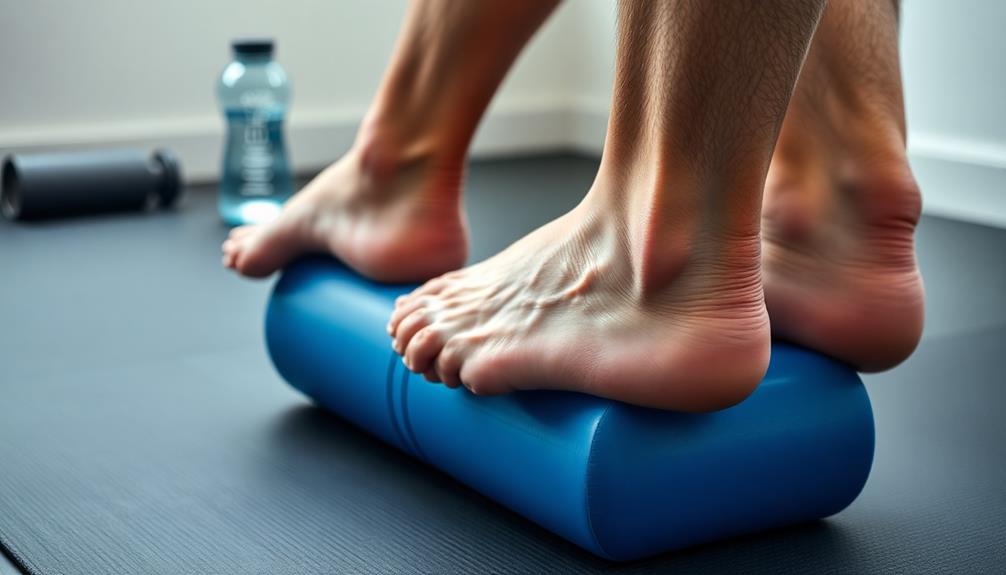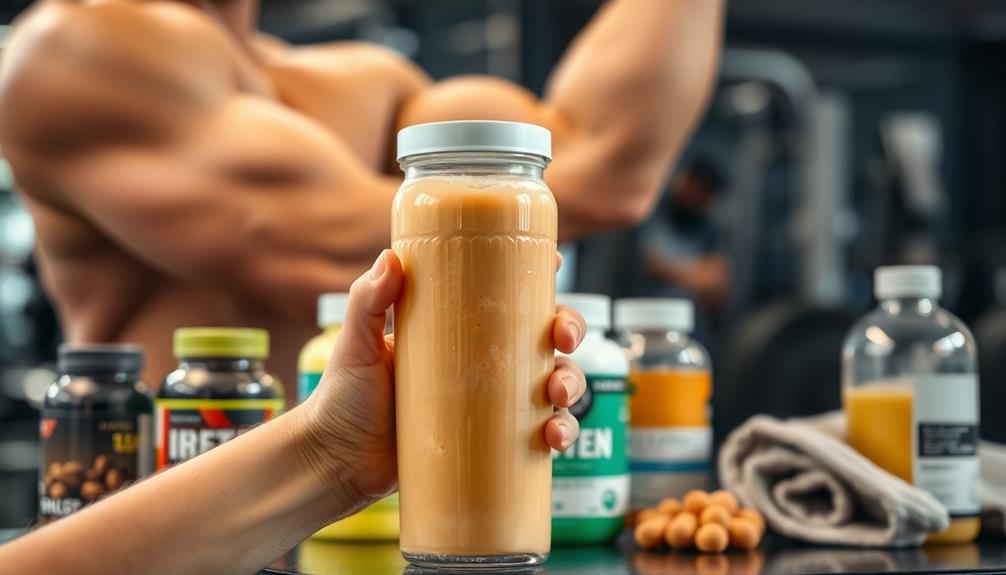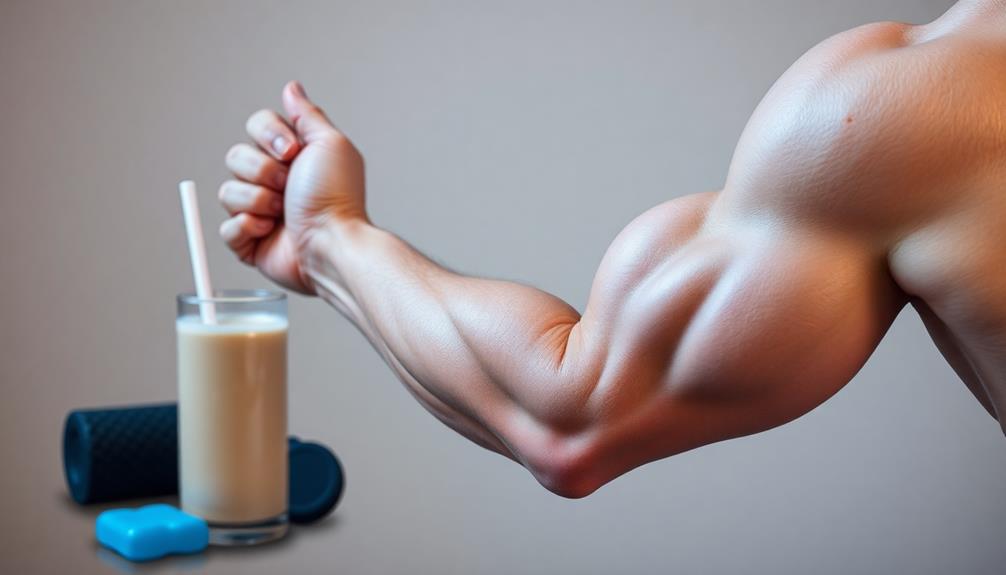To enhance muscle repair after your workout, focus on these seven key strategies: Prioritize post-workout nutrition with a balanced meal of protein and carbs within 30 minutes. Stay hydrated by drinking plenty of water or electrolyte-rich fluids. Get adequate sleep, aiming for 7-9 hours nightly. Incorporate active recovery through low-intensity exercises like yoga or swimming. Use foam rolling techniques to target major muscle groups. Consider taking ice baths to reduce inflammation and improve blood flow. Finally, explore supplementation options such as protein powders, BCAAs, or creatine. These tips will help you optimize your recovery process and maximize your fitness gains.
Core Insight
- Consume a balanced meal with protein and complex carbs within 30 minutes post-workout.
- Stay hydrated by drinking water or electrolyte-rich beverages to aid nutrient transport and waste removal.
- Get 7-9 hours of quality sleep to support muscle recovery and growth.
- Incorporate active recovery exercises like light jogging or yoga to reduce muscle soreness.
- Use foam rolling techniques on major muscle groups to enhance recovery and flexibility.
Prioritize Post-Workout Nutrition

Eating the right foods after your workout is key for muscle recovery and growth. Try to eat a balanced meal within 30 minutes of finishing exercise. This helps your body use the nutrients better and start repairing itself faster.
Your meal should have both protein and carbs. Go for 20-30 grams of protein from sources like lean meats, fish, eggs, or a shake. Protein gives your muscles the building blocks they need to recover. Combine that with complex carbs from whole grains, fruits, or veggies. Carbs will refill your energy stores.
Remember to drink plenty of water too. It carries nutrients to your muscles and helps clear out waste. For tough or long workouts, consider adding electrolytes to your water.
Stay Hydrated

Staying hydrated is just as important as eating well after a workout for repairing your muscles. When you don't drink enough water, your body struggles to get nutrients to your muscles, which slows down recovery. To stay hydrated, drink water throughout the day and during exercise. You can also drink coconut water after working out, as it has a lot of electrolytes that help with muscle recovery and hydration.
Staying hydrated helps you recover from workouts in several ways:
- Gets nutrients to your muscles better
- Reduces muscle pain and cramps
- Speeds up overall recovery time
After exercising, replace the fluids you lost through sweat by drinking water or a sports drink with electrolytes. Aim to drink 16-24 ounces of fluid for every pound of body weight you lost while working out. Don't wait until you're thirsty to drink, as thirst means you're already dehydrated. Make drinking enough water a priority to help your muscles recover and reach your fitness goals.
Get Adequate Sleep

Getting enough sleep is crucial for building muscle and recovering after workouts. When you sleep, your body makes a hormone that helps your muscles grow and heal. Try to get 7-9 hours of good sleep every night. Melatonin pills or herbal teas may help you sleep better.
To sleep well, go to bed and wake up at the same times each day. Stop using your phone, computer, or TV an hour before bed because their light can mess with your sleep. Make your bedroom cool, dark, and quiet.
If you can't get enough sleep at night, take a short nap during the day. Napping for 20-30 minutes can help you feel refreshed without making it hard to sleep later. Just remember, good sleep is as important as exercise for reaching your fitness goals.
Incorporate Active Recovery

Incorporating active recovery into your routine is a great way to help your muscles heal and boost your overall fitness. Active recovery means doing low-intensity exercises that get your blood flowing and reduce soreness in your muscles. It's an essential part of a balanced workout plan that can help you stay consistent and avoid burning out. Mobility tools can also be super helpful for active recovery by targeting specific muscles and improving flexibility. These tools can aid in muscle repair and enhance your performance.
Try these active recovery activities:
- Go for a light jog or brisk walk
- Do some gentle yoga or stretching
- Swim or try water aerobics
Use Foam Rolling Techniques

Foam rolling is a great way to help your muscles feel better after a workout. Here's how to do it right:
- Start with a soft foam roller, then switch to a harder one once you get used to it. The hard ones are great for getting deep into your muscles, but take it slow at first so it doesn't hurt too much.
- Focus on big muscle groups like your thighs, hamstrings, and back.
- Roll over each area slowly for about 30-60 seconds.
- Take deep breaths while you roll to help you relax and deal with any discomfort.
- Try to foam roll 2-3 times a week to keep your muscles happy and healthy.
Take Ice Baths

Taking an ice bath after a workout can help you recover faster and feel better. It might seem tough at first, but it's worth it. Ice baths can reduce swelling, improve blood flow, and help get rid of waste in your muscles.
To take an ice bath, fill your tub with cold water and add ice until it's between 50-59°F (10-15°C). Try to stay in for 10-15 minutes, focusing on the parts of your body that need it most.
If you're new to ice baths, start slow. Use warmer water and stay in for a shorter time. As you get used to it, you can make the water colder and stay in longer.
Consider Supplementation

Supplements can help your muscles recover after a workout. Protein powders like whey or casein have amino acids that support muscle repair and growth. In 2024, top picks include Dymatize ISO100 and Optimum Nutrition Gold Standard. They provide 25g of protein per serving and are easy to digest. BCAAs (branch-chain amino acids) can also reduce soreness and fatigue.
Creatine is a well-known supplement that boosts strength and muscle size when used with weight training. To lower inflammation, try omega-3s or curcumin. Vitamin D and magnesium help with muscle function and recovery too.
Frequently Asked Questions
How Long Does It Take for Muscles to Fully Repair After a Workout?
Your muscles typically need 24-48 hours to fully repair after a workout. However, this can vary depending on the intensity of your exercise, your fitness level, and individual factors. It's essential to allow adequate recovery time.
Can Massage Therapy Help With Muscle Repair and Recovery?
Yes, massage therapy can greatly help with muscle repair and recovery. It'll increase blood flow, reduce inflammation, and alleviate muscle tension. You'll experience faster healing, improved flexibility, and decreased soreness. It's an effective complement to your post-workout routine.
Does Age Affect Muscle Repair and Recovery Time?
Yes, age does affect muscle repair and recovery time. As you get older, you'll notice it takes longer for your muscles to bounce back after intense exercise. Your body's ability to repair tissue naturally slows down with age.
Are There Specific Exercises That Promote Faster Muscle Repair?
While there's no magic exercise for faster muscle repair, you'll benefit from low-intensity activities like walking, swimming, or yoga. These promote blood flow, reduce inflammation, and aid recovery. Don't forget to stretch and stay hydrated too!
How Does Stress Impact Muscle Recovery and Repair Processes?
Stress can impede your muscle recovery. It elevates cortisol levels, which interfere with protein synthesis and slow down repair processes. You'll likely experience increased inflammation and delayed healing if you're under constant stress during recovery periods.

